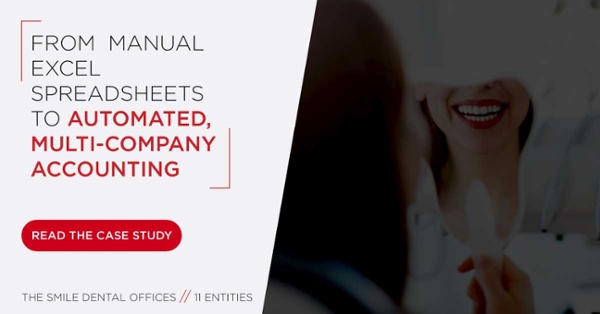How great accounting software solves Excel spreadsheet problems

If you're like many business leaders, Excel spreadsheets are a critical part of your daily operations. For years, companies have used Excel as the go-to tool for financial data management. However, as companies grow, relying on spreadsheets for accounting, forecasting, and reporting becomes more of a burden than a solution. The inefficiencies of Excel spreadsheets can lead to errors, wasted time, and missed opportunities. Switching to a comprehensive cloud-based accounting solution can drastically improve your financial management processes.
The problems with Excel spreadsheets
1. Errors in data
One of the biggest problems with Excel spreadsheets is the high risk of errors. According to Forbes, 88% of spreadsheets contain errors, with high-profile cases like JPMorgan Chase’s $6 billion loss due to Excel mistakes highlighting the serious consequences of spreadsheet errors. Errors can arise from manual data entry, formula mistakes, or accidental overwriting, and they can go unnoticed for long periods. These mistakes can lead to incorrect financial reporting, miscalculations, and ultimately, poor business decisions. In fact, financial modeling firm F1F9 also reports that 50% of spreadsheets used by large companies contain material defects, underlining the significant risks associated with relying on spreadsheets for critical financial management.
If you're interested in further discussions on spreadsheet errors, Forbes published "Beyond Spreadsheets" in 2021, which reported that an analysis of multiple studies estimated that 88% of spreadsheets contain significant errors. You can read more about this on Forbes.
2. Time-consuming manual entry
Excel requires a significant amount of manual input, which is incredibly time-consuming. Financial reports, budgets, and forecasts need constant updates, cleaning, and manipulation of data. This manual work not only takes up valuable employee time but also diverts focus from more strategic tasks.
Recognizing these challenges, many organizations are adopting digital transformation strategies to streamline operations. According to a 2024 survey by FinancesOnline, 70% of organizations have already implemented or are working on a digital transformation strategy to enhance efficiency and reduce manual processes.
By moving to an automated accounting solution like Gravity Software, companies can free up valuable time, enabling employees to focus on strategic data analysis and decision-making, rather than manual data entry.
3. Redundant or obsolete data
As multiple team members access and update the same Excel file, the risk of obsolete and redundant data increases. With each person adding information without properly cleaning up old data, it’s easy for spreadsheets to become bloated with irrelevant data that no longer serves its purpose. The lack of a proper data management system in Excel can make it difficult to identify which numbers are accurate and up-to-date. Without proper data management, businesses also face the challenge of tracking trends or historical data, which can be critical for decision-making and forecasting.
4. Difficult to share and collaborate
Sharing Excel spreadsheets across teams and departments can be awkward and inefficient. Unlike cloud-based accounting solutions, Excel is not designed for real-time collaboration. When multiple users open the same file, there’s always a risk that changes will be overwritten, leading to confusion. Plus, sharing large files via email or cloud storage is cumbersome and can create version control problems. In today's fast-paced business environment, this lack of collaboration tools can significantly slow down decision-making and productivity.
5. Lack of data visibility and analysis
Excel is great for storing raw data but not ideal for gaining insights from that data. The sheer volume of information in a spreadsheet can make it harder for analysts to draw meaningful conclusions. Additionally, when the data isn't organized in an intuitive way, it increases the risk of misinterpretation. For businesses looking to spot trends, identify opportunities, and make data-driven decisions, relying on Excel for financial management falls short.
How Gravity Software can help
Gravity is a cloud-based multi-entity accounting software designed to eliminate the limitations of Excel spreadsheets. By automating financial management tasks, improving data accuracy, and providing real-time reporting, Gravity Software offers several advantages over traditional spreadsheet-based methods. Here's how it solves the problems associated with Excel:
1. Automation for accuracy
Gravity Software automates routine accounting tasks, reducing the risk of human error that is prevalent in Excel. With real-time data updates and automated reporting, you can eliminate the manual effort of cleaning and updating spreadsheets. Automation also ensures that your financial reports are always accurate, up-to-date, and consistent, giving you the confidence to make informed business decisions.
2. Cloud-based collaboration
Unlike Excel, Gravity Software is cloud-based, which means your financial data can be accessed and updated by authorized users from anywhere, at any time. This eliminates the need to worry about sharing files via email or cloud storage and ensures that everyone is working from the same up-to-date information. Whether your team is working from home, in the office, or at multiple locations, Gravity Software makes collaboration seamless.
3. Real-time data insights
With Gravity Software, you can gain real-time insights into your financial data, whether you're analyzing data for a single entity or multiple companies. Gravity's powerful reporting tools allow you to generate customized financial reports that consolidate data from different entities into one centralized database. This makes it easy to track performance across various business units, compare trends over time, and make better-informed decisions.
4. Scalable and customizable
Gravity Software is built on the Microsoft Power Platform, which means it is highly scalable and customizable. Whether you’re a small business with a single entity or a large enterprise with multiple locations, Gravity Software grows with you. You can customize dashboards and reports to fit your business’s specific needs, and Gravity’s multi-entity accounting software capabilities ensure seamless consolidation of financial data across all your business units.
5. Reduced overhead and maintenance
Gravity Software is fully cloud-based, meaning there’s no need to invest in expensive hardware or worry about ongoing maintenance. Gravity automatically updates and maintains your software, freeing up your time and reducing your overhead costs. You’ll no longer need to deal with the hassle of manually installing software updates or performing system maintenance, which is common with on-premise solutions.
Testimonial from The Smile Dental Group
"Before we found Gravity Software, we were spending countless hours managing financials across multiple locations using Excel spreadsheets. It was time-consuming and prone to errors. Moving from Excel to Gravity has been a game-changer for us. The multi-entity functionality, custom dashboards, and automated reporting now give us real-time insights into each location's financials. The ease of use, quick implementation, and responsive support team made the transition seamless. Gravity Software has drastically improved our back-office efficiency and saved us tens of thousands of dollars on software and implementation costs. I highly recommend it to other small to medium-sized businesses with multiple locations!"
— Michelle Keckler, Accounting Coordinator, The Smile
Read the full case study here to learn more about how Gravity Software helped The Smile Dental Group streamline their financial management.
Additional benefits of switching to Gravity Software
1. Simplified financial management
With Gravity Software, managing your finances becomes easier and more efficient. You’ll spend less time dealing with spreadsheets and more time focusing on growing your business. From accounts payable to general ledger and multi-entity consolidation, Gravity offers a comprehensive suite of tools to manage your financials with ease.
2. Enhanced security
Data security is a top concern for businesses, especially when it comes to financial information. Gravity Software is built on the Microsoft Power Platform, which is known for its robust security features. Your data is stored securely in Microsoft’s trusted data centers, ensuring that your business’s financial information is protected against unauthorized access.
3. Seamless integration with other tools
Gravity Software integrates seamlessly with other business applications, including Dynamics 365 CRM, Power BI, and Ramp. These integrations allow you to streamline workflows, improve reporting, and enhance overall business performance. You can even integrate with third-party apps like Bill.com and AvidExchange, making it easy to connect all your financial systems in one place.
Ready to move beyond spreadsheets
If you're still relying on Excel for your financial management, it's time to consider the benefits of a modern accounting solution like Gravity Software. By automating key accounting functions, improving collaboration, and offering real-time insights, Gravity Software solves the problems that come with using spreadsheets. Don’t let outdated tools hold your business back. Schedule your online demo today and experience the future of financial management.
Gravity Software
Better. Smarter. Accounting.
This article was originally published in July of 2017 and has been updated and edited for clarity.



